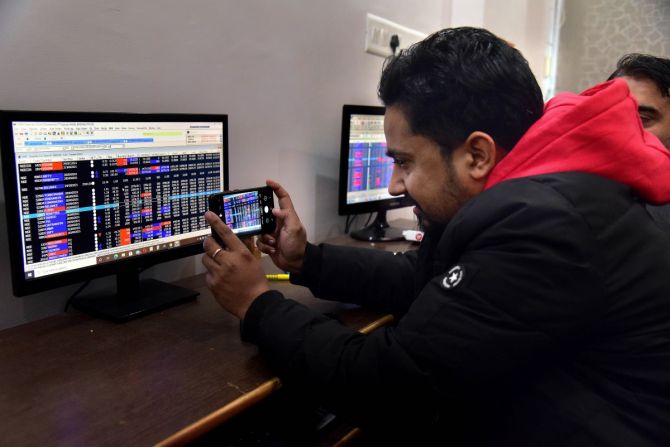'Indian macro conditions have never been better, and many businesses will safely compound earnings over the next five years.'

Tapering by the US Federal Reserve and inflation are the two biggest risks facing the equity markets, says Mukul Kochhar, head of equities, Investec India.
In an interview with Samie Modak, Kochhar says monetary policy normalisation is a definite risk, but India is better placed, thanks to its strong macros.
What are the key risks facing the global equity markets and India?
The key risks facing the global equity markets are tapering -- slow withdrawal of excess liquidity by major central banks -- and inflation.
While we think that given India's current account normalisation, we will be able to withstand tapering, inflation is more of an open risk.
Tapering should have an impact on global risk assets like commodities, and we are cautious about this asset class.
Inflation impacts different stocks and sectors differently, and a more nuanced approach is required to stock selection. Specific to India, politics remains the biggest risk.
We have enjoyed stable, reform-oriented governance for the past six years, which has been a reason for market outperformance. Any change in the outlook for political stability in the country will impact the Indian stock market negatively.
Will policy tapering lead to a lot of turbulence?
Given that our current account is roughly in balance, we believe India will be able to withstand a normalisation of the monetary policy in the US.
Do you see large-scale capital outflows from risky assets on account of it?
Yes. While the scale is difficult to predict, a growing risk-off sentiment is a reasonable expectation as the monetary policy normalises.
The low cost of equity is a clear reason for the buoyant performance of risk assets, and removal of accommodation is a definite risk. However, as mentioned above, India is better placed (than in the past) to handle this normalisation, since our current account is roughly in balance.
What's the outlook for Indian equities over the next year?
Being advisors to active funds, we tend to be stock pickers. In that respect, even though valuations of the Indian equity indices are approaching highs, and are also the most expensive globally, we continue to find good investments.
One has to understand that the Indian macro conditions have never been better, and many businesses will safely compound earnings over the next five years.
We look for investments where (for a reason), the earnings trajectory is under-appreciated by investors.
Can fixed income perform better going ahead?
In the near term, yields may harden if inflation picks up. However, after many years, the RBI is displaying clear intent to keep liquidity and funding costs for the economy low.
Once again, this wriggle room is being provided to the RBI owing to improving trade and investment flows.
India like other emerging markets tends to be reflexive where an improving current account balance allows the government leeway to adopt a more pro-growth stance, which, in turn, in India's case, can be even more beneficial to the current account as policies encourage domestic investment.
India's equities have done quite well this year vis-à-vis global peers. What has led to the outperformance?
India's improving macroeconomic environment, alongside ample global liquidity, has driven the stock outperformance in the country.
Investment flows have been positive, and improving the availability of capital has raised the prospects of better growth, especially among smaller companies.
A key ingredient for growth in mid companies is the availability of capital, and that is a distinct positive for India.
Will valuation premium and expensive valuations, compared to historical averages, lead to underperformance over the medium term?
This is likely true of the broader market. Having said that, we continue to find reasonably priced stocks to invest in.
How do you see India's economic prospects over the long term?
India's economic prospects haven't looked better than these in over the past two decades, as evidenced by multiple metrics:
1. Our current account is in balance;
2. We are the third-largest recipient of foreign direct investment globally;
3. We are the only major economy (apart from the US) with a growing working-age population;
4. Corporate profitability is approaching all-time high figures;
5. banks have been recapitalised.
Finally, internal politics seems to be stable (also a risk), and global politics are helpful for India's economic prospects.













 © 2025
© 2025